
I am going to do the newsletter for this month a little differently. I held off doing it until we were done with all the letters to the congregations.
I want to compare the letters by sections. What did we learn in the greeting? The commendation? The condemnation.
That is as far as we are going to get in this devotion. We’ll finish it up in the next one.
Making the Connections #1
Who Are Vision Man and Audio Man?
The first problem I encountered when looking at the letters to the Messianic congregation is – Who is talking? The Person John saw — in my opinion – wasn’t necessarily the One Who was talking.
The physical description used went back to Daniel’s description in his prophesies. Talking about white hair, eyes like flame, feet of bronze, and voice like roaring waters (Rev. 1: 13-15) was always specific to God, not Jesus.
That being said, the words spoken seem to be attributed to Someone else. Most point to Jesus.
- “… ‘The words of him who holds the seven stars in his right hand, who walks among the seven golden lampstands” (Rev. 2: 1 ESV).
- “… ‘The words of the first and the last, who died and came to life” (Rev. 2: 8 ESV).
- “… ‘The words of him who has the seven spirits of God and the seven stars …’” (Rev. 3: 1 ESV).
- “… ‘The words of the holy one, the true one, who has the key of David, who opens and no one will shut, who shuts and no one opens’” (Rev. 3: 7 ESV)
- “… ‘The words of the Amen, the faithful and true witness, the beginning of God’s creation’” (Rev. 3: 14 ESV).
True, some point to God – or both.
- “… ‘The words of him who has the sharp two-edged sword’” (Rev. 2: 12 ESV).
- “… ‘The words of the Son of God, who has eyes like a flame of fire, and whose feet are like burnished bronze” (Rev. 2: 18 ESV).
Personally – and I may be right or wrong here – it wouldn’t surprise me if it were Both. Think about it.
Whose message did we say it was anyway? God’s.
“The revelation of Jesus Christ, which God gave him to show to his servants the things that must soon take place …” (Rev. 1: 1 ESV enphasis added).
The message is about Jesus, but it is from God.
God gave Jesus authority (Mt. 28: 18). His coming to visit John on the island of Patmos would have just solidified that. In addition to telling us about future events, God told us where Jesus was at then – in a position of authority.
But God didn’t give Jesus everything. This has to be God. Even Jesus didn’t know timing. “But concerning that day and hour no one knows, not even the angels of heaven, nor the Son, but the Father only” (Mt. 24: 36 ESV).
I think this is an example of the divine being One. They may be God the Father, God the Son, and God the Spirit – but They are the Three in One.
Since Jesus had already ascended back to Heaven, they may have gotten back into One mode.
I doubt any of the Three would have thought this too trivial a topic to pass on participation.
Making the Connections #2
What Were the Congregations Doing Right?
Before we get into a discussion of doing right and wrong, let’s just say this.
The congregations at Smyrna and Philadelphia were doing things right – and they still got a letter. The congregations at Sardis and Laodicea were doing things wrong – and they still got a letter. The rest were somewhere in the middle – and they still got a letter.
God will come to us where we are when we are still open to repenting and returning to Him.

Jesus, as Head of the Church, knows the condition of our souls — for good or bad. He commended the congregations on what they were doing right.
- We should be doing our best to honor Jesus. Our work shouldn’t just be about the task. It should be about worshiping God.
- Faith is about consciously, purposefully putting our confidence in God. It proves His divinity.
- We must patiently endure our trials and tribulations until Jesus returns, worshiping and praising Him through them all.
- They were not compromising with the world during their persecution, because they were still holding on to the name of God. When we hold onto Jesus’ name, we make Him the center of our lives. We allow Him to fill every nook and cranny of our existence. We not only confess Him as Lord and Savior, but we also obey Him.
- Becoming Christ’s disciples really meant they were going counterculture than almost everyone else.
- We have to have service that is ministry. We have to have faith. We have to have endurance and growth.
- We must stay strong when worldview people try to lead us away from God. We must be able to identify goats masquerading as sheep in order to win them back to God and not be deceived by them. Oh, there are always pretenders within our congregations. There are those who believe they are strong disciples yet hold on to invalid interpretations.
- Don’t grow weary doing God’s Will when His definition of success doesn’t match the world’s.

- We are called to give up worldly things to show we are different from the world and put our allegiance on God. Our being a disciple isn’t about the physical. It isn’t about what is going on around us or even doing the do’s and not doing the don’ts. Being a disciple is about imitating God and having the mindset of Christ. We have to have divine character and attitude.

Making the Connections #3
What Were the Congregations Doing Wrong?
We have to remember something very important. We may call ourselves a Messianic congregation – or church – and not be part of the Church.
- We have to accept that we may be wrong. Only God knows everything. We aren’t going to get everything right.
- Probably all of these congregations thought they were doing okay. Instead, they had allowed their relationships with God to suffer from decay instead of abandonment. While they probably did make some conscious decisions to disobey God, they let it slip away.
- I say decay because they were all still working to expand His kingdom. The problem was that, in essence, they were going through the motions. Some were doctrinally sound, but they had a heart problem.
- The acts are important. The mindset is more important. When we don’t have the mind of Christ, we are false disciples. It is our submission to Christ that brings us salvation and makes us disciples.
- They had lost the knowledge of their need to repent.
- If we aren’t serving God with passion, are we really serving God? Hasn’t our love for Him diminished?

- Instead of losing our first love as being about losing the joy that we have at conversion, losing our love for Christ is much more critical. We are to put God as priority #1. According to the greatest commandment, loving God is the priority.
- But then losing our first love could mean we’ve gotten the first and second commandments switched. But sanctification isn’t about doing the work. Works aren’t just the Matthew 25 to-do list. It is about our spiritual condition. It is about becoming a mature disciple. We have to make sure our good works are God’s good works.
- We can’t love others by only addressing their physical needs. As disciples of Christ, we have to love others by addressing their spiritual needs while addressing their physical needs. Ignoring that would mean we have lost the love of Christ.
- We can’t lose that desire to continue learning about God. We have to seek His presence so that He can reveal Himself to us.
- The world’s pull can be difficult to see. Satan is the father on lies. He still works his cunning on us today.
- While the congregation overall was strong in the truth, the some that lacked the discipline to truly remain faithful. This manifested itself in two different serious ways. Things may not always be as they appear. We must never put anything, especially our sinful desires, above God. They were deliberately focusing on the worldly desires of people, including sexual desires.
- We can’t be a Pharisee and bank on tradition and our way of interpretation. We have to be open to changing our way of thinking when God reveals His true meaning to us.
- Jesus knows the true condition of our souls. He knows when we are living church and playing church.
- Sardis had the reputation for doing the work God had for them. Then something happened, and they died spiritually.
- The disciples at Sardis were putting on a show. They weren’t really who they said they were spiritually.
- The backslide was gradual. Usually, it is so gradual that we don’t see it. We don’t keep up our personal relationship with God. We focus more on the world than on God. We are critical of others instead of loving them. We refuse to submit to God.

- If we do not work to grow in grace and knowledge, we will morally decline. We lose our spiritual graces.
- How can we as churches today not know we are a dead church? (And I am not talking number wise.) Probably most of them that are dead because we don’t want to admit we are Matthew 7: 21 people.
- How can we tell a church is dying? Sin doesn’t bother us anymore. We are more focused on the religion and ceremony and not the relationship with God. We are missing any part of God’s plan. We don’t try to withstand against sin and temptation. We aren’t evaluating ourselves in order to repent and turn from our sins. We are doing church on autopilot because the spiritual aspect is gone. We no longer seek God or Jesus.
- They were in complete danger of dying spiritually because they were working from the wrong principles and working toward the wrong ends.
- They weren’t as strong as they may have thought they were because they were putting their trust in worldview things rather than God. A whatever-floats-your-boat, indifferent attitude isn’t that to which God is striving. He demands His worship His way. A subtle but critical cause for us, our lukewarmness is taking our focus off guard and putting it on the world. At times, this world clamors for that focus, but we must keep God as our first priority.
- They may have lost their first love first. Their apathy probably played a big part — with a huge dose of neglect. Another major contributing factor had to have been unbelief. Either they didn’t totally believe in Who Jesus was, or they didn’t totally believe God’s promises.
- I think that lukewarm can also apply to those disciples who believe they have interpreted God’s Word 100% correctly, but we haven’t. We are so convinced that our ways are right, we won’t listen for even a second to any other interpretation. Not caring about the truth means our relationship with God isn’t really important. Did they even see the need for salvation? They like so many today may not see things as sinful, negating the need for conversion.
- We also disobey God’s laws and commandments by continuing to sin. We may think that they are little inconsequential sins — or maybe no sins at all – but God does. That disobedience, even if it is only to some of God’s laws and commandments, causes us to be lukewarm.

- Sober mindedness does not mean only that we are doing things in moderation. But this isn’t talking about being in the middle of the extremes. Being sober minded means our focus is on God. We are content even in the extremes because our trust is in Him.
- Being lukewarm fosters no response to God. It cultivates an indifference.
- Maybe a little worse than the indifference the Laodiceans were experiencing is the carelessness under which they operated.
- If hot means that the congregation was following God’s Will, and cold means they were following Satan’s, then lukewarm means they were compromising with the worldview. Compromise is unacceptable!
- The consequence of remaining lukewarm was to be expulsion. The church will be left in its sinful state. Christ will no longer be its Advocate.
- What this is saying is our neglect cuts God more than our disobedience. He would rather we chose not to follow Him than to choose to follow Him and not. That is a direct insult to God.
- The Laodiceans were being hypocrites because they are imposters. What did Jesus call the Pharisees — hypocrites and vipers. This is because they are trying to serve two masters.
- The Laodiceans thought they didn’t need God – that they were prosperous enough on their own. They thought they needed nothing besides their wealth. The wealth they had was earned because of their skill and hard work.
- Focus was on the self-made, which implies anything but God-made. There are no God statements. He is totally out of the picture.
- Besides that, the Laodiceans thought they were the best Messianic congregation around — and they weren’t afraid to tell you. They were really boasting. Yes, they were probably doing what they were doing without realizing they were doing it.
- They were sounding an awful lot like the Pharisees of Jesus’ day. They were full of themselves, too, and knew exactly what God had intended. Even if these sentiments were only thoughts in the mind they are incriminating enough.
- The Laodiceans also thought they were morally rich. They thought they were being an inclusive congregation. The more moral we think we are, the poorer we really are. That is one reason we do not get to Heaven by being good people alone.
- Instead, of being in a good place, the Laodiceans were seeing things the exact opposite of what they were. They were wretched and pitiable because they didn’t have God. They were poor because they didn’t have the richness of God’s grace. They were blind to their need because they thought things in this world were their reward. They were naked without the white garments of righteousness.
Father God. Thank You for giving us Your Word as instruction. We want to worship You in the way You wish us to do. Grow us to be more like You. Amen.

To read devotions in the On the Day of the Lord theme, click the button below.
Devotions in the The Letters to the Congregations series